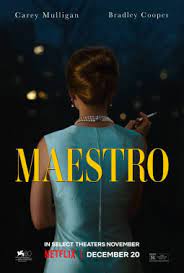Eye For Film >> Movies >> Maestro (2023) Film Review
Maestro
Reviewed by: Anne-Katrin Titze

Bradley Cooper’s Maestro (Spotlight Gala selection of the 61st New York Film Festival), stars Cooper as Leonard Bernstein and Carey Mulligan as his wife Felicia with their three children Jamie (Maya Hawke), Alexander (Sam Nivola), and Nina (Alexa Swinton). Produced by Kristie Macosko Krieger (Steven Spielberg’s Oscar-nominated producer for The Fabelmans, West Side Story, and Bridge Of Spies), with a screenplay by Josh Singer (Oscar win with Tom McCarthy for Spotlight), elaborate production design by Kevin Thompson, sound mix by Steve Morrow, and the always excellent work of costume designer Mark Bridges (Oscar wins for Michel Hazanavicius’s The Artist and Paul Thomas Anderson’s Phantom Thread), Maestro is a starry affair on all fronts, shot by Matthew Libatique (Oscar-nominated for Cooper’s A Star Is Born and Darren Aronofsky’s Black Swan).
At the beginning of Maestro, I couldn’t help but think about Gay Talese’s latest book, Bartleby And Me, which was published earlier this fall and includes the following description, told to Talese by Frank Sinatra’s haberdasher: ”Sinatra bought luxurious orange Scottish cashmere sweaters not only for himself but for many of his friends and such employees as his pilot, who always wore an orange sweater when flying Sinatra around in the singer’s Lear jet”. We see Cooper as a white-haired Bernstein at the piano at home. Tears roll down his cheeks, as cameras from the press are reflected in the mirror. He wears a burnt orange cashmere polo sweater. It looks soft and comforting and autumnal.

Powerful, larger-than-life 20th century icons are catnip for biopics. Lenny is a tornado sweeping through the lives of everyone in his path, including the likes of Jerome Robbins (Michael Urie), Aaron Copeland (Brian Klugman), Betty Comden (Mallory Portnoy) and Adolph Green (Nick Blaemire). He cannot sit still and the film flashes onto many important episodes of the famed conductor and composer’s world. And lets not forget the intricacies of Bernstein’s profession - Music Director of The Metropolitan Opera, Yannick Nézet-Séguin, came on board as conducting consultant.
From getting a chance to step in for conductor Bruno Walter to a dream sequence in which he himself dances as one of the three sailors in On the Town, Cooper demonstrates his talents and drive. Felicia, as played by Carey Mulligan, is engulfed by him from the beginning of the courtship and only later during their marriage allows some unspoken truths to surface.
An actress herself and used to the limelight, Felicia wears dresses that are elegant and nuanced. As he did throughout his illustrious career, and especially for Phantom Thread, Mark Bridges lets the fabrics, the trimmings, the cuts tell tales on their own, as well as those of the wearer. A pale sea foam silk dress, Sixties’ shifts in brilliant hues, a white turtleneck for the porch, a cotton marinière shirt to be one of the boys - the clothes signal meaning.
Bernstein, so we hear, loves music so much that it keeps him alive. And he loves people so much that it is hard for him to be alone. His love life is complicated and Felicia, who keeps everything buttoned up (note the many gorgeous buttons on her garments) asks him not to tell their daughter (Maya Hawke) the truth about the rumours swirling concerning his male lovers. When Felicia herself has enough of his philandering she puts a pillow with his toothbrush outside the door, plus his initialled velvet slippers (which look just like the ones Merle Oberon embroidered for Noël Coward).
One of the best scenes of the movie takes place at the Bernsteins’ Central Park West apartment on Thanksgiving, with a gigantic Snoopy floating by outside, and Felicia letting us in on a Chilean proverb to “never stand under a bird that is full of shit.” The future holds musical triumphs, plates of cocaine, the license plate MAESTRO 1, and much much more in this very full film about a very full life.
Bradley Cooper has a bit of Miss Turnstiles in the fantasy sequence from the movie version of On the Town, where Gene Kelly imagines from the description on the subway poster how Vera-Ellen tries to be everything for everybody all at once - the artist, the dancer, the homebody, the seducer. Especially in the sequences early on, partly shot in black and white, Cooper’s Lenny comes across as manic and his direction flitters along in frantic speed, as though he had to prove something with every single shot.
The much written-about prosthetic nose (by makeup designer Kazu Hiro, a prosthetics expert) was constructed so that it would, besides the visuals, also change the actor’s breathing and thus speech. But instead of edging closer to the man he portrays, the device made me even more aware of the artifice and the fact that I am watching an actor do his damnedest to resemble someone whose face and mannerisms and musical genius are well-known and accessible to anyone, because of the abundance of footage that exists of him.
There is a big difference between biopics that portray historical figures, famous before the invention of cinema, or someone barely known as a moving picture since, and biopics about dead icons of the 20th or 21st century, whose looks and voices we know all too well, Marilyn and Elvis, the Kennedys and James Dean, etcetera, etcetera. Mommy Dearest changed the legacy of Joan Crawford, an example of the power the genre has.
Reviewed on: 26 Nov 2023
















